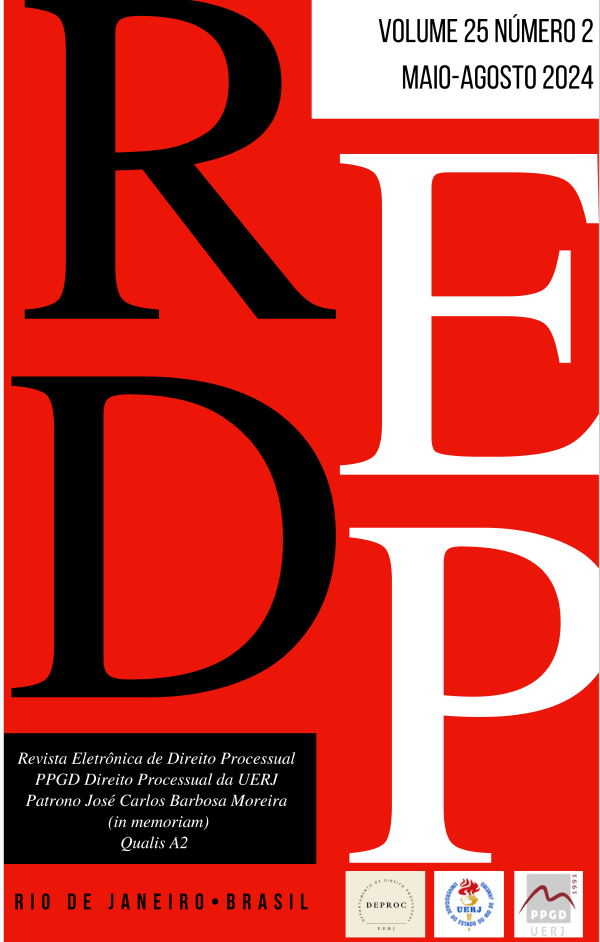CONSIDERAÇÕES SOBRE O PRINCÍPIO DA LIVRE APRECIAÇÃO DA PROVA NO PROCESSO PENAL PORTUGUÊS
DOI:
https://doi.org/10.12957/redp.2024.85245Abstract
The principle of free assessment of evidence is provided for in Article 127 of the Code of Criminal Procedure. The free conviction of the judge and the rules of common experience will translate the result of the evidence produced in the seat of a discussion and judgment hearing and will constitute the substratum of a condemnatory or acquittal decision. This principle removes any form of pre-setting the value to be assigned to each of the admissible and legally applicable means of proof in criminal proceedings. Judicial practice has revealed cases (some even mediatic) of assessment of evidence in a very different way between judges of different courts, e.g. from a conviction handed down in the first instance with a maximum penalty of 25 years in prison, there is an acquittal on appeal, based on the same evidentiary material. It is a topic that confuses those less knowledgeable about procedural rules. Despite some tensions within the procedural system, the divergence of assessment of evidence is inseparable from being a person and the horizon of individual perceptions. A clear understanding of the principle in question and its proper use are fundamental to the regular administration of criminal justice.
Downloads
Published
How to Cite
Issue
Section
License
Copyright (c) 2024 Ana Paula Guimarães

This work is licensed under a Creative Commons Attribution 4.0 International License.
Todos os artigos publicados na Revista Eletrônica de Direito Processual (REDP) (Departamento de Direito Processual, Universidade do Estado do Rio de Janeiro, Brasil) são licenciados por meio de uma Licença Creative Commons - Atribuição 4.0 Internacional (CC BY 4.0).
Os autores retêm os direitos autorais de seu artigo e concordam em licenciar seu trabalho com a licença CC BY 4.0, aceitando assim os termos e condições específicos desta licença disponíveis no seguinte website: https://creativecommons.org/licenses/by/4.0/legalcode.
- Os autores concedem à REDP o direito de primeira publicação, de se identificar como publicadora original do trabalho e concedem à revista uma licença de direitos não exclusivos para utilizar o trabalho das seguintes formas: Reproduzir, vender e distribuir cópias eletrônicas ou impressas do manuscrito como um todo, de partes específicas do manuscrito e de suas traduções para qualquer idioma;
- O uso do artigo por terceiros é livre, contanto que a integridade da publicação seja mantida e seus autores originais, periódico de primeira publicação e detalhes de citação sejam identificados.
Dentro dos termos da licença, os autores podem entrar em acordos contratuais adicionais separados para a distribuição não exclusiva da versão publicada do trabalho na revista.
Copyright and Licensing
All articles published in the Procedural Law Electronic Review (REDP) (Department of Procedural Law, State University of Rio de Janeiro, Brazil) are licensed under a Creative Commons License - Attribution 4.0 International (CC BY 4.0).
- Authors retain copyright to their article and agree to license their work under the CC BY 4.0 license, thereby accepting the specific terms and conditions of this license available at the following website: https://creativecommons.org/licenses/by/4.0/ legal code.
- Authors grant REDP the right of first publication, to identify itself as the original publisher of the work, and grant the journal a non-exclusive license to use the work in the following ways: Reproduce, sell and distribute electronic or printed copies of the manuscript as a whole, of specific parts of the manuscript and its translations into any language;
- Use of the article by third parties is free, as long as the integrity of the publication is maintained and its original authors, first publication journal, and citation details are identified.
Within the terms of the license, authors may enter into separate additional contractual agreements for the non-exclusive distribution of the published version of the work in the journal.




